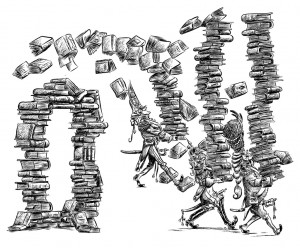Let’s Talk Japan is a twice monthly, interview format podcast covering a wide range of Japan-related topics. Host Nick Harling (Mie-ken, 2001-03) lived in Japan from 2001 until 2005, including two great years as a JET Program participant in Mie-Ken. He practices law in Washington, D.C., and lives with his wife who patiently listens to him talk about Japan . . . a lot.
Looking for a good summer read? Check out Episode 12 of the Let’s Talk Japan podcast to hear recommendations from members of the J Book Club of Washington, DC. Enjoy!
Nick
If you have not already done so, be sure to “Like” the podcast on Facebook, and follow the podcast on Twitter @letstalkjapan. Additionally, please consider leaving a positive rating and/or review in iTunes.
CLAIR Magazine “JET Plaza” series: David Namisato (Aomori)
Each month, current and former JET participants are featured in the “JET Plaza” section of the CLAIR Forum magazine. The June 2013 edition includes an article by JET alumn David Namisato. Posted by Celine Castex (Chiba-ken, 2006-11), currently programme coordinator at CLAIR Tokyo.
***********
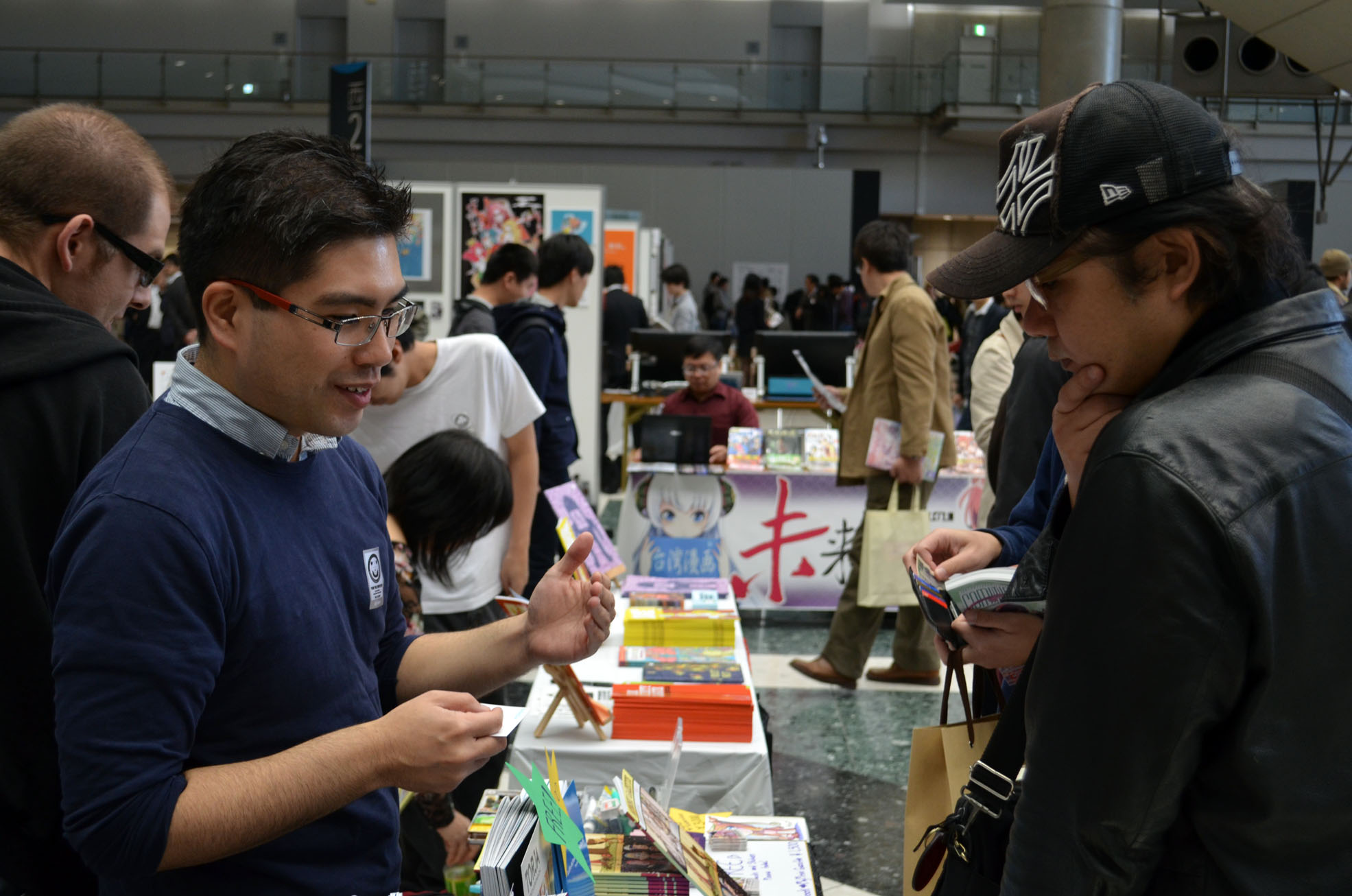
“I went on the JET Programme because I had quit art, but I returned to art because I went on the JET Programme, and thanks to that, here I am, over a decade later, an illustrator and comic book creator, with my JET experience influencing many of my works.”
David Namisato (Aomori-ken, Ajigasawa Town, 2002-04), is from Toronto, Ontario, Canada. He came to Japan on the JET Programme looking for a different career path after animation school, and spent two years in a rural town of Aomori as a CIR. Back in Canada, he started a comic series about the JET Programme experience for the JETAA Toronto Newsletter. Life After the B.O.E. quickly gained popularity inside and outside the JET community, to become a book in 2011. David is now a professional illustrator and has just released his new fantasy comic The Long Kingdom #1.
My Long Journey to the Beginning
In October of 2001, having become disillusioned with art, I decided to drop out of animation school, and to try something completely different and applied to the JET Programme.
Fluent in Japanese and looking for translation and interpretation experience as well as to transition in to a more planning and administrative career, I thought the position of Coordinator of International Relations (CIR) would be a good fit.
I was admitted to the JET Programme in 2002 as a CIR, and went to Japan. However, my contracting organization, Ajigasawa Town in Aomori Prefecture, used CIRs as elementary school English instructors. I had no planning or administrative duties beyond curriculum design and lesson planning, nor did I have translation or interpretation work. Rather, I was entrusted to teach English to children grades one through six at six of the town’s elementary schools.
As an elementary school English instructor, my art skills that I had abandoned were quickly resurrected and came in quite handy as I would use drawings to explain difficult vocabulary and grammar to my students. Slowly my joy of drawing returned, and as it returned, I also began contributing covers to the Aomori AJET newsletter.
In the spring of 2005, six months after my two years as a CIR ended, I decided to give art another try, and I started work as an illustrator creating illustrations and comics for children’s science, and history magazines in Canada. Read More
I’ll Make It Myself!: What I Ate in Nagano, Day 2: Yamanouchi
L.M. Zoller (CIR Ishikawa-ken, Anamizu, 2009-11) is the editor of The Ishikawa JET Kitchen: Cooking in Japan Without a Fight. A writer and web administrator for The Art of Travel, ze also writes I’ll Make It Myself!, a blog about food culture in Japan; curates The Rice Cooker Chronicles, a series of essays by JETs and JET alumni on the theme of cooking/eating and being alone in Japan; and admins The JET Alumni Culinary Group in LinkedIn.
New Rice Cooker Chronicles submissions always welcome. Just e-mail it to jetwit [at] jetwit.com.
Day 1: On the Road to Yudanaka Onsen (長野の名産を食べる旅:第一日)
On our second day in Nagano, we headed to Yamanouchi to see the snow monkeys at the Jigokudani Monkey Park. We kind of took the long way around, but eventually we got on the right path.
JET alum children’s book author Rob Weston keeps producing
 Rob Weston (Nara-ken, 2002-04), author of the one-of-a-kind children’s novel Zorgamazoo, continues his uniquely rhyming ways. In February, he published Prince Puggly of the Spiff and the Kingdom of Spud. And in November he will be publishing a phosphorescent children’s book–The Creature Department.
Rob Weston (Nara-ken, 2002-04), author of the one-of-a-kind children’s novel Zorgamazoo, continues his uniquely rhyming ways. In February, he published Prince Puggly of the Spiff and the Kingdom of Spud. And in November he will be publishing a phosphorescent children’s book–The Creature Department.
About Prince Puggly:
Prince Puggly of Spud and the Kingdom of Spiff is the story of Puggly, a commoner chosen to be the prince—not the king, definitely not the king—of the extremely unfashionable Kingdom of Spud.
The newly-crowned Puggly is surprised to receive an invite to a party in the kingdom next door, the painfully chic Kingdom of Spiff. When Puggly shows up in plaid trousers and a polka-dot cape, the stylish Spiffians are not amused—especially when when it turns out Puggly’s invite is a forgery.
But hark! All is not lost. Puggly soon discovers an unexpected ally in Francesca, the bookish Princess of Spiff. Together, the two friends set out to teach the Spiffs an absurd lesson in style…
For more info, go to: http://robertpaulweston.com/
Here are clips of Rob from the 2009 JETAA NY JET Alumni Author Showcase.
JQ Magazine: Book Review – ‘Yoko Ono: Collector of Skies’

“The book’s release is timed to coincide with Ono’s 80th birthday on February 18, and provides readers snippets of info on some tumultuous periods during her lifetime.” (Amulet Books)
By Rashaad Jorden (Yamagata-ken, 2008-2010) for JQ magazine. Rashaad worked at four elementary schools and three junior high schools on JET, and taught a weekly conversion class in Haguro (his village) to adults. He completed the Tokyo Marathon in 2010, and was also a member of a taiko group in Haguro.
“Everybody knows her name, but nobody knows what she does.”
That line—uttered by the most famous of her three husbands—could accurately sum up Yoko Ono for a long time. But that shouldn’t be the case. Fortunately, thanks to a new book co-written by Nell Beram and Carolyn Boriss-Krimsky, readers have insight into this remarkable woman’s life.
Yoko Ono: Collector of Skies—so titled because Ono has always looked to the sky for inspiration—delves into the life of the famous avant-garde artist and musician, from her childhood in Japan and the U.S. to her chart-topping success in her seventies. The book’s release is timed to coincide with Ono’s 80th birthday on February 18, and provides readers snippets of info on some tumultuous periods during her lifetime.
Ono’s journey is presented in an easy-to-read format geared toward young adults. Unlike many other biographies, where all the photographs tend to be lumped together in a couple of sections, the photos in Collector of Skies are spread throughout the book, and they range from one in which Ono is wearing a kimono at the age of two to another taken at the inaugural lighting of the Imagine Peace Tower in Reykjavik in 2007. The authors also use quotes from Ono to expound upon certain periods and moments of her life.
Of course, any story about Yoko Ono has to make heavy mention of her relationship with John Lennon, and the middle of the book is largely devoted to her life with the former Beatle. While Collector of Skies might not reveal anything earth shattering for hardcore Lennon and Beatles fans, younger readers (or those unfamiliar with the Beatles) will learn not just the real story of the group’s breakup, but more importantly, the duo’s activism.
JQ Magazine: JQ&A with Bruce Feiler on ‘The Secrets of Happy Families’

“One big idea in my book is that families should adapt all the time. The single best thing we’ve done is to add a weekly family meeting. We ask three questions, based on a popular program called ‘agile families.’ And no surprise: that idea was born in Japan in the culture of real-time change.” (Courtesy of HarperCollins Publishers)
By Sharona Moskowitz (Fukuoka-ken, 2000-01) for JQ magazine. Sharona is interested in fresh, new voices in fiction and creative nonfiction.
New York Times bestselling author and columnist Bruce Feiler (Tochigi-ken, 1987-88) has written a range of books dealing with topics as varied as life in Japan (depicted in 1991’s Learning to Bow), religion, and his own diagnosis with cancer.
His latest book, The Secrets of Happy Families, is a playbook for today’s family with tips and advice for increasing overall happiness and strengthening the family unit. Unlike other family-related books, Feiler does not advocate one particular method or philosophy over another; rather, he has done a thorough investigation of what happy families have in common and offers readers a slice of the pie.
In this exclusive interview, Feiler shares how his experience in Japan has given him insight into family life across cultures, as well as his take on the modern family’s trials and tribulations.
It seems the book market is already glutted with all sorts of self-help books about families. What sets your book apart and why do you feel that it is particularly timely?
In many ways, I was motivated by the deluge of self-help books. They’re boring, tried, and out of fresh ideas. As a parent, I was completely frustrated and had tons of questions about how to make my family function more effectively, and the only books out there were from “family experts.” Meanwhile, in every other arena of contemporary life—from Silicon Valley to elite peace negotiators, from championship sports teams to the Green Berets—there are proven new ways to make teams and groups run more smoothly. I wanted to know what those people were doing with their own families, then test their ideas with mine. Not every idea worked. That’s why I put over 200 new ones in the book, because what clicks with your family may be different from what clicked with mine. But my hope is that if you take three ideas, you’ll have a happier family in a week.
In the chapter about the agile manifesto, you talk about the importance of “being part of the family team.” In writing about the importance of teamwork within the family, were you inspired at all by your experience in Japan, a culture which valorizes the group above all else?
I think it may be more the other way around, in that I was attracted to Japan because I’ve always been interested in tight groups and well-run teams. At the time I lived in Japan, in the late 1980s, Americans still believed that the individual mattered above all else. But one thing we’ve learned from the Internet is that we all have a natural inclination toward groups, social networks, and other gatherings of people. The first generation of happiness research has shown us that relationships matter above all else. Happiness is other people. And the people who matter most to us are our family. Yet there have been almost no books that tell us how to do that.
Are there other cultural practices you observed in your time in Japan which you believe could benefit American families?
One I learned while in Japan is that being part of a group doesn’t just happen. Japanese schools, in particular, work on it. I remember a school trip I went on where classes were divided into small groups. The number one rule was, don’t be late. The number two rule was, only one person in each group was allowed to have a watch. Guess what! You better stick together. Having a close family doesn’t just happen, either—you have to work on it. Fortunately, there are lots of new ideas out there to do that, which I’ve tried to gather.
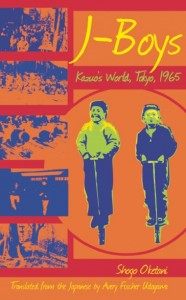
“J-Boys is a historical lesson for readers of all ages. Although the story takes place 20 years after World War II, Japan is still very much scarred by the war and Oketani mentions how it affected the mindsets of the country’s people.” (Stone Bridge Press)
By Rashaad Jorden (Yamagata-ken, 2008-2010) for JQ magazine. Rashaad worked at four elementary schools and three junior high schools on JET, and taught a weekly conversion class in Haguro (his village) to adults. He completed the Tokyo Marathon in 2010, and was also a member of a taiko group in Haguro.
The 1960s were a decade of enormous change around the world. Although Japan didn’t experience the upheaval some other countries did during that period, for one teenager, the mid-1960s were shaping up to be a different era.
Shogo Oketani’s novel J-Boys: Kazuo’s World, Tokyo, 1965 takes readers into the lives of young Kazuo Nakamoto and, to a lesser extent, his friends—younger brother Yasuo, his friend Nobuo, Nobuo’s older brother Haruo, and Kazuo’s classmate Minoru. As steeped in tradition as Japan is (and continues to be), Oketani paints a picture of a society beginning to be seriously touched by foreign influences. Inspired by the 1964 Olympics in their hometown, Kazuo and Haruo usually head to an empty lot after school to emulate 100-meter champion Bob Hayes (It was Kazuo’s dream to be an Olympic sprinter). And like many young people across the world, Haruo went crazy for a quartet from Liverpool, often singing “A Hard Day’s Night.”
Essentially, J-Boys (which was based on Oketani’s childhood)serves a journey through the ups-and-downs of adolescence while introducing younger readers to Japanese culture and the changing landscape of the country. Kazuo’s father speaks about the rise in TV’s popularity with an air of sadness, blaming it for the loss of a nearby cinema. Likewise, Kazuo feels the new Tokyo (much of it fueled by Olympic-related construction) he sees during his Saturday afternoon walks is not necessary an improved one. Kazuo develops a crush on a girl he’s known for quite a while, but sees a couple of close friends move just prior to the start of a new school year. So he realizes he’s about to embark on an unpredictable journey.
JET Alum Author Beat 1.20.13
Gemma Vidal (Okayama-ken, 2010-12) is a recently returned JET seeking work in product licensing and copyright (if it’s within the publishing industry, even better!). You can usually find her in her little web spaces Gem in the Rough and Peachy Keen (her JET adventures) or training with San Jose Taiko. If you know of any authors/aspiring writers you’d like to see featured in JET Alum Author Beat, just contact Gemma at gem.vidal [at] gmail.com.
- It’s less than a month until Robert Weston’s (Nara-ken, 2002-04) release of his new book, Prince Puggly of the Spiff and the Kingdom of Spud, and to mark the countdown he posted some of the artwork for the book. Victor Rivas is also behind the illustrations of Robert’s previous book, Zorgamazoo. Speaking of Zorgamazoo, it seems like we might be seeing this on the big screen! By the producers of Shrek no less! Congratulations on the film option Robert!
- What’s going on in the Japanese pop culture arena? Take a look at Roland Kelt’s (Osaka-shi, 1998-99) blog on his brief picture post on Japan’s Comiket, the mecca of all things self-published. Looking at his website made me realize that it was Hayao Miyazaki’s 72nd birthday this month. Shame on me, I know.
- Ari Kaplan, JET Alumni and author of Reinventing Professional Professional Services: Building Your Business in the Digital Marketplace, recently had his book translated into Japanese, which is under the title ハスラー プロフェッショナルたちの革新 . The translated book can be found at the publisher’s website. Here is what Ari had to say about his book being translated:
The publication of the Japanese edition offered me the opportunity to express my gratitude for the remarkable experience I had almost two decades ago. I dedicated this version to the Hyogo Prefectural Board of Education, Kobe Kohoku High School (where I taught), and the head of the English department at my school, among others.
Until next time JET alumni!
JET alum Bruce Feiler set to publish latest book: The Secrets of Happy Families
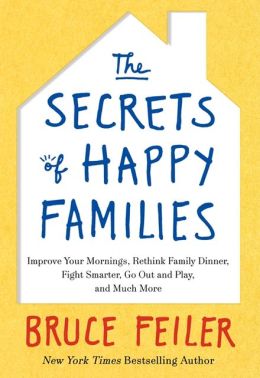 The latest from JET alum Bruce Feiler (Tochigi-ken, 1989-90), author of Learning to Bow, The Council of Dads, and, most recently, The Secrets of Happy Family, as well as several books on the Middle East including Walking the Bible, Abrahamand Where God Was Born. To read prior columns, please click here.
The latest from JET alum Bruce Feiler (Tochigi-ken, 1989-90), author of Learning to Bow, The Council of Dads, and, most recently, The Secrets of Happy Family, as well as several books on the Middle East including Walking the Bible, Abrahamand Where God Was Born. To read prior columns, please click here.
In a few weeks Harper Collins will publish Bruce’s new book, THE SECRETS OF HAPPY FAMILIES: Improve Your Mornings, Rethink Family Dinner, Fight Smarter, Go Out and Play, and Much More.
From Bruce: “Like many people we know, my wife, Linda, and I felt squeezed between aging parents and rising children. So over several years, I set out to find the smartest ideas and cutting-edge techniques to make our family happier. Avoiding the usual “experts,” I sought out creative minds from Silicon Valley to the set of “Modern Family” to the country’s top negotiators, asked what they were doing with the families, then tested their ideas at home with Linda and our girls. Some of these solutions failed, but many more improved our lives deeply and brought us all a lot closer.”
The book will be excerpted in the New York Times and appear on the cover of PARADE. Bruce will be featured on Good Morning America, Katie Couric, and other shows. Bruce will also be touring around the country.
There will also be an event in NYC at the Barnes & Noble on 86th Street on the East Side on February 20. (Stay tuned for a JETAANY announcement about going to the event followed by a happy hour.)
Learn more here: http://amzn.to/QwQxP5.
For more regular updates, follow Bruce on Facebook: www.facebook.com/brucefeilerauthor.
And Twitter: www.twitter.com/brucefeiler.
JQ Magazine: Book Review – ‘Samurai Awakening’
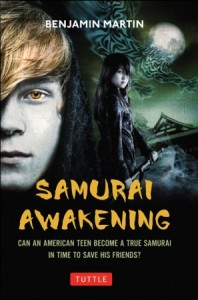
“Ultimately, Samurai Awakening is a fun read that makes you think you’re watching a movie.” (Tuttle)
By Rashaad Jorden (Yamagata-ken, 2008-2010) for JQ magazine. Rashaad worked at four elementary schools and three junior high schools on JET, and taught a weekly conversion class in Haguro (his village) to adults. He completed the Tokyo Marathon in 2010, and was also a member of a taiko group in Haguro.
For those who have lived in Japan, there were probably times when nothing seemed to be going right while struggling to get adjusted to a new culture. But eventually—or maybe miraculously—things take a 180 degree turn.
Well, that happened in Samurai Awakening, Benjamin Martin‘s work of fiction for young adults. Martin—currently a fifth year Okinawa Prefecture JET—tells the story of David Matthews, an exchange student spending the year in Japan. David is frustrated and unhappy due to the fact he can’t speak Japanese well and hasn’t made any close friends. Fittingly, very early in the story, he is bloodied in a fight with students at Nakano Junior High School.
But after attending a local temple ceremony, David learns a new god has created special powers in him. He is now able to speak Japanese fluently, fight incredibly well and turn into a cat. However, those are not the only surprises in the book. His host family the Matsumotos, who are famous sword makers, are also keeping a secret handed down to their ancestors by the Emperor of Japan. And it is with the Matsumotos that he must work to save his host sister Rie, as wolves have taken up residence in her body.
JQ Magazine: Book Reviews – ‘Belka, Why Don’t You Bark?’ and ‘The Future Is Japanese’
A pair of this year’s releases from Haikasoru.
Belka, Why Don’t You Bark?

“As a writer, Furukawa is possessed of a kinetic voice that seems to teeter on the edge of insanity. The hyperactive prose is sometimes poetic, sometimes sharp like a stinging slap in the face. Often, it’s both.” (Haikasoru)
By Sharona Moskowitz (Fukuoka-ken, 2000-01) for JQ magazine. Sharona is interested in fresh, new voices in fiction and creative nonfiction.
War: It’s a Dog’s Life. Battle Is a Bitch. War and Fleas.
These were just a few of the potential titles I had streaming through my mind as I sat down to write the review of Belka, Why Don’t you Bark?, the newly translated novel by Hideo Furukawa. But the truth is, love it or hate it (and you very well may hate it, but more on that later), Belka is far too original to be reduced to silly catchphrases or bromides.
At the very start of the novel, readers are met with a detailed canine family tree complete with the dogs’ names and nationalities. In looking back, this might as well have been a de facto warning: if anthropomorphism is not your thing, put this book down immediately.
The story begins in 1943 on the Aleutian Island of Kiska where four military dogs are left by the Japanese and then claimed by U.S. troops after the Japanese retreat. One dog dies and the other three go on to produce the offspring that populate the novel and occupy the branches of the family tree. Belka chronicles the lives of the military dogs who trace their roots back to Kiska, intertwined with the story of the young daughter of a yakuza boss who is kidnapped in the USSR and has a psychic connection to dogs. Belka is a book about history through canine eyes, namely the wars of the 20th century, as Furukawa tells us “history is moved, rolled this way and that, so simply. The twentieth century was a pawn, as were the dogs.”
WIT Life #222: Japan’s Global Leadership
WIT Life is a periodic series written by professional Writer/Interpreter/Translator Stacy Smith (Kumamoto-ken CIR, 2000-03). She starts her day by watching Fujisankei’s newscast in Japanese, and here she shares some of the interesting tidbits and trends together with her own observations.
Earlier this week I went to a lunchtime 座談会 (zadankai, or round-table talk) at Columbia Business School’s Center on Japanese Economy and Business (CJEB) entitled “Global Leadership Challenges for Japanese Companies.” The discussion was led by Sheena Iyengar, the S.T. Lee Professor of Business at the school and moderated by Hugh Patrick, the Center’s Director. Some of the themes explored during the course of the hour and a half session were how to stimulate entrepreneurship, the issue of global leadership being thought of as equivalent to English ability, and the cultural fear of making mistakes as hindering innovation. There was an interesting characterization of America as being on the promotion side of the spectrum (risk-taking), and Japan falling on Read More
JQ Magazine: Book Review – Haruki Murakami’s ‘1Q84’

“Murakami’s previous books were like delicious sandwiches that left you wanting more. 1Q84 is like a two-foot long sub that filled you to bursting, but you’re still not totally satisfied.” (Vintage International)
Roland Kelts, don’t kick me in the balls—
One man’s attempt to review a book honestly while still keeping friends
By Rick Ambrosio (Ibaraki-ken, 2006-08) for JQ magazine. A staple of the JET Alumni Association of New York (JETAANY) community, Rick manages their Twitter page and is an up-for-anything writer.
My girlfriend wouldn’t shut up about it.
“1Q84 is the best! Ah, when it comes out in English you need to read it!” Just talking about it made her rush to find her old copies (it was broken up into three books in Japan) and start reading them again. She was enthralled, to say the least. I’ve been a Murakami fan for a while: Norwegian Wood was emotional and sexually riveting; Dance Dance Dance was creepy as hell but lots of fun; Kafka on the Shore blew my mind. So I was hungry for 1Q84.
I picked it up shortly after it came out…and put it down for a while…then picked it up again…then down… then up…I think you get the idea. My feelings can kind of be summed up like this: Murakami’s previous books were like delicious sandwiches that left you wanting more. 1Q84 is like a two-foot long sub that filled you to bursting, but you’re still not totally satisfied.
The plot follows two people tied together by fate, love, and inter-dimensional happenstance. Tengo is an author and math teacher who finds himself embroiled in a shady plot to write an award-winning book. Aomame is a fitness instructor with a decidedly darker side job. Both find themselves in an altered version of 1984 called 1Q84 that deviates from the previous reality in specific ways. Those changes seem to revolve around a cult, a beautiful young girl, a book and mysterious “Little People.” Their battle to beat the odds and find each other, discover where they are, and who’s behind the changed world is an epic journey told through alternating perspectives.
1Q84 had all the things I love about Murakami: Super complex, interesting and engaging characters, crazy inter-dimensional sex, lots of mystery, and supernatural elements that bring it right on the cusp of reality, teetering between a fantasy realm and the real 1984. His ability to walk that line (like a cat walking a picket fence for those who love cats not only in Murakami novels, but also in reviews of Murakami novels) is astounding and he does it…for a really long time.
Now in Paperback: “For Fukui’s Sake: Two years in Rural Japan” by JET alum Sam Baldwin
|
JQ Magazine: Book Review – ‘Professor Risley and the Imperial Japanese Troupe: How an American Acrobat Introduced Circus to Japan—and Japan to the West’
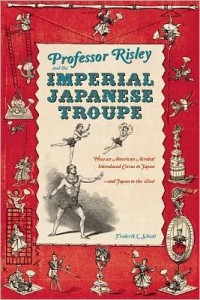
“Chock-full of illuminating illustrations and gorgeous printed ephemera that would make any contemporary typographer swoon, Professor Risley and the Imperial Japanese Troupe is a jet-set adventure in pop culture scholarship sure to appeal to anyone interested in Japan’s history on the world stage.” (Stone Bridge Press)
By Jessica Sattell (Fukuoka-ken, 2007-08) for JQ magazine. Jessica is a freelance writer, and was previously the publicist for Japan-focused publishers Stone Bridge Press and Chin Music Press. She is interested in the forgotten histories of culture, and has often considered running away and joining the circus.
We’re still riding the “Cool Japan” wave that crested at the turn of the millennium, but our fascination with the country and its culture didn’t quite stem from just anime, Harajuku fashions, or J-pop. In Professor Risley and the Imperial Japanese Troupe: How an American Acrobat Introduced Circus to Japan—and Japan to the West, award-winning author Frederik L. Schodt argues that contemporary interest in Japan’s popular culture has its roots in the travels and cross-cultural interactions of a band of 19th century Japanese circus performers and a colorful American impresario.
Published in November by Stone Bridge Press, Professor Risley explores a critical and exciting time in history, when an interest in foreign cultures was rapidly expanding beyond the privileged parlors of the upper class and Americans and Europeans were greatly fascinated by anything Japanese. Schodt offers an intriguing case study of both early Japanese conceptions of the West and the West’s first looks at modern Japan, but it is also a mystery of sorts: Why did a group of acrobats that were incredibly popular with international audiences in the 1860s fade from the annals of performing arts history? How was the life of “Professor” Richard Risley Carlisle, arguably one of the most extraordinarily talented and well-traveled performing artists in history, buried in the folds of time? Schodt suggests that we may never know the answers, but we can sit back and enjoy the show as their histories unfold.
This story begins, fittingly, with the question, “Where Is Risley?” Schodt artfully traces “Professor” Risley’s early travels and performance history like an elusive game of connect-the-dots, piecing together itineraries, publicity notices and press clippings until a clear pattern of a fascinating life emerges. Risley seemed to be everywhere and nowhere, and led a full life of jet-setting and adventure-seeking at a time where transcontinental travel was only beginning to open up to those outside of the diplomatic realm. We follow him on a decades-long journey across the United States, Europe, Australia, New Zealand, Southeast Asia, China…and finally to Japan.
Risley arrived in Yokohama in early 1864 and immediately went to work setting up a fantastic Western-style circus to delight foreign residents and Japanese locals alike. As the country had re-opened to the world just five years earlier, it was a risky time to be in Japan, and non-Japanese residents lived with underlying worries of Shogunate-dictated expulsion and violence from disgruntled ronin. That didn’t quite stop Risley’s entrepreneurial spirit, but he did eventually run into a series of difficulties with his shows—and a stint in dairy farming, which, in the process, led him to introduce ice cream to Japan. He hadn’t originally intended to stay in Japan for long, but most likely due to the Civil War raging back home in America, he bided his time and explored his options. Thankfully, his stay there—paired with an almost desperate talent for improvisation—would lead to the world’s first taste of Japanese popular culture.



